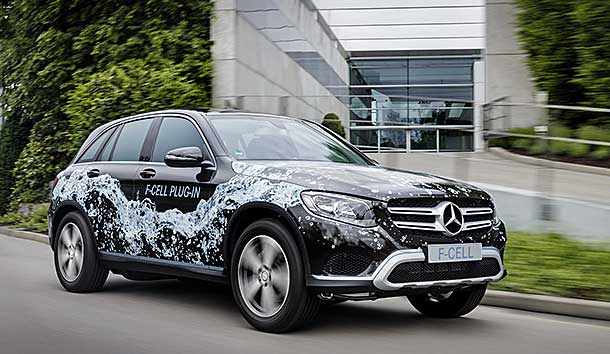
A commercial hydrogen fuel cell plug-in hybrid is finally going to make it to the marketplace! Daimler has agreed to join forces with Mercedes-Benz engineers in order to develop a new, compact fuel cell system that will fit into the conventional engine compartment of the vehicle. The Mercedes-Benz GLC has paved the way for the new generation of vehicles. The GLC F-CELL, in addition to its fuel cell, provides a huge lithium-ion battery as a way of further innovating the next generation of FCEVs and PHEVs.
The battery has been rated at 9kWh which serves as an added energy source for the electric motors. The battery can also be charged externally through a plug-in technology. The intelligent operating strategy has been further developed together with the combined battery system and fuel cell technology to promote comfort and efficiency. Thus, the new GLC F-CELL should gain a combined range of 300 miles in accordance with the NEDC.
The production of the fuel cell system has been made possible via the Daimler “strain plants” in Unterturkheim and in Nabern. Meanwhile, the Mannheim plant has been responsible for the production of the carbon-fiber encased H2 tanks. The lithium-ion battery also is provided by the Daimler subsidiary Deutsche Accumotive in Kamenz, Saxony. Daimler AG has currently been working in a systematic manner in order to prepare for the series production of Mercedes-Benz GLC F-CELL.
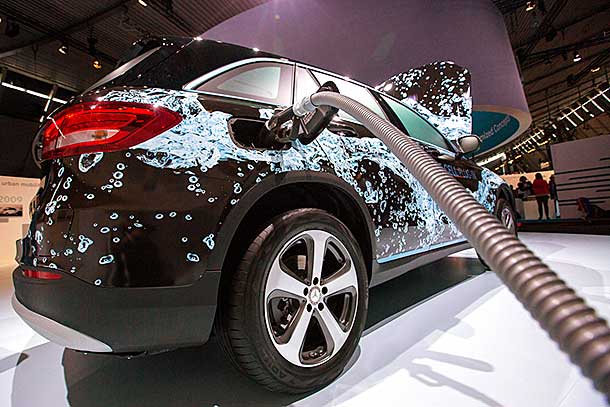
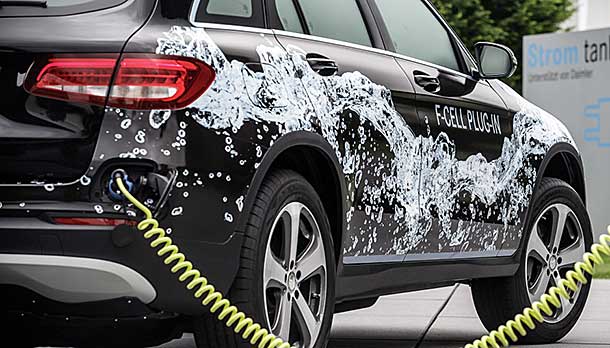
On the other hand, the Mercedes-Benz plant in Bremen has also been working to produce the family-friendly sports utility vehicle suited for daily use. The production line of the GLC has started in July 2015 and this facility acts as the center of competence for this model series. The company also partnered with EDAG which supports the Bremen plant in the event of integrating the drive system of the GLC F-CELL.
Available for Release in 2017
Mercedes-Benz has announced the release of their hydrogen-powered GLC F-CELL SUV in 2017. According to Bloomberg, this will broaden the demand of this new technology as it will provide the public with a certain type of battery / fuel cell combination that could be charged with both a wall socket and hydrogen. There are also some notable features for this type of vehicle, which includes the following:
Long Range
The GLC F-CELL should be able to run around 300+ miles before needing to be recharged AND refueled again. The Mercedes GLC F-Cell plugin option will give the vehicle sufficient charge for driving the first 30 miles (enough for most people to go to work and back), which makes it more appealing to buyers despite the minimal refueling stations located in the U.S., Germany and elsewhere.
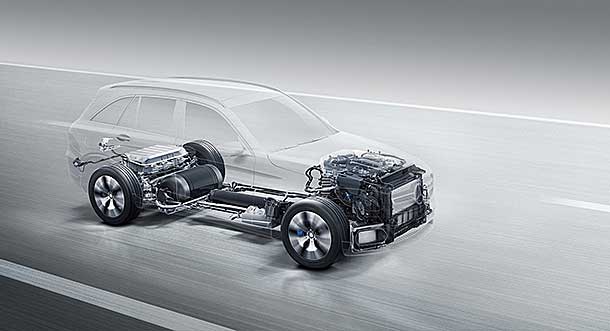
Huge Lithium Ion Battery
According to Mercedes, the new GLC F-Cell model will have a large lithium ion battery (At the same time, the fuel cell system is more compact and utilizes 90% less platinum, which enables the car to have a range of three-hundred plus miles). The vehicle can travel its first 30 miles on pure electric power. It can be charge via public charging stations, a common household wall socket or with a Mercedes-Benz wall box. The GLC F-Cell also uses regenerative braking and coasting to charge the battery.
Hydrogen Tanks
The Mercedes-Benz GLC F-Cell has a couple of carbon-fiber hydrogen tanks of about 10,000 psi that can be refilled in just about three minutes. Basically, one of the tanks will be situated below the car’s center and the other will be installed at the back. This type of vehicle will also be able to carry about 4.3 kilograms of hydrogen, enough to offer around a range of 280 miles, not including the battery range.
Sources say that Ford Motors helped in the development of the fuel cell stack and was built in Canada. However, the powertrain is completely assembled in Germany in which the F-cell was built in a plant next to the huge Mercedes-Benz facility in Bremen.
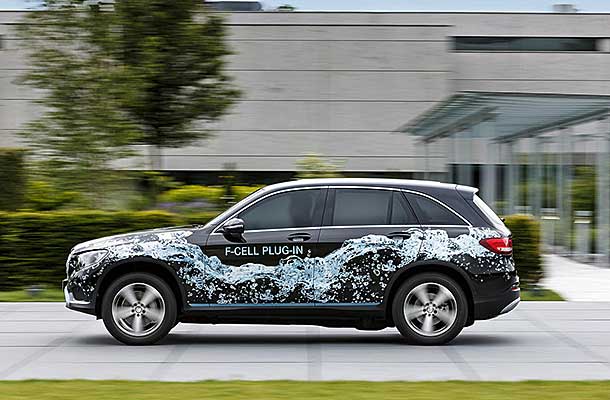
Testing the Hydrogen Fuel Cell
The prototype of a B-class F-Cell fuel cell car was first unveiled in 2009. But Mercedes-Benz wasn’t able to sell that to the public. Instead, they leased it to a few customers as well as fleet buyers in order to determine the patterns of usage of these people.
According to experts, when the Mercedes-Benz GLC F-Cell hits the market, it will be the first in the world of its kind. The production of a new hydrogen fuel cell plugin hybrid is expected to be successful by combining the best electrification technologies into one car.
References
http://blog.caranddriver.com/h2-go-mercedes-set-to-launch-plug-in-fuel-cell-glc-class/
http://www.topspeed.com/cars/mercedes/2017-mercedes-benz-glc-f-cell-ar173523.html